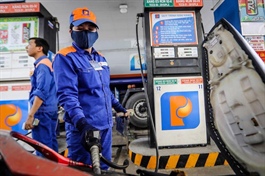Viet Nam's animal feed imports jump to $3.1b
Viet Nam's animal feed imports jump to $3.1b
Viet Nam's imports of raw materials for processing animal feed in the first seven months of this year surged to US$3.1 billion as domestic supply only met about one-third of local demand.

The Department of Livestock Production of the Ministry of Agriculture and Rural Development said that according to the General Department of Customs, the animal feed industry had to spend nearly $2.7 billion to import corn and soybeans in the first seven months.
The nation also spent more than $400 million to import other raw materials, including oilseed meal, wheat, fish meal, bone meal, animal protein, and a mixture of trace elements.
Domestic production of corn and soybeans has met about 37 per cent of the demand from the animal feed industry, so in past years, Viet Nam had to import a huge amount of corn and soybeans, according to the Department of Livestock Production.
Corn imports reached 5.1 million tonnes in the first seven months of this year, worth $1.8 billion. Corn imports declined by 21.9 per cent by volume on year but were unchanged by value, and corn imports in July reached 500,000 tonnes, worth $191.7 million.
Soybean imports were 1.3 million tonnes in the first seven months of this year, worth $893.6 million, which was the same volume from the same period a year ago but 22.8 per cent more in value. Soybean imports in July reached 250,000 tonnes, worth $189.4 million.
Brazil, the United States and Canada were the three main soybean suppliers to Viet Nam in the first half of this year, accounting for 99.2 per cent of the imports.
According to the department the COVID-19 pandemic has disrupted the global supply chain, including the supply chain of animal feed material. The decrease in supply and higher transportation costs have made the cost of raw materials and finished products higher.
In addition, the conflict between Russia and Ukraine, the world's largest and fourth largest wheat exporters, respectively, is having a great impact on global food supply and prices, directly affecting corn prices.
On the other hand, the United States has increased production of bioethanol from corn, while South American countries, such as Argentina and Brazil, have lost crops due to drought. This has caused a sharp drop in corn exports on the global market, pushing up corn prices.
Meanwhile, some countries recently suspended food exports to ensure domestic food security. That will reduce the food supply, further pushing the price of feed materials up.
It has also caused many difficulties for businesses and breeders due to higher production costs while the selling price of livestock products has tended to decrease.
According to the General Department of Customs, from 2013 to now, Viet Nam's import value of animal feed and raw materials increased every year, excluding 2017 and 2019.
Deputy Minister of Agriculture and Rural Development Phung Duc Tien said that Viet Nam's corn and soybean productivity was low, while production costs were high and profits were less attractive than other crops.
According to Nguyen Xuan Duong, vice chairman of the Viet Nam Animal Feed Association, that almost all imported corn is genetically modified corn. Viet Nam has also allowed the cultivation of genetically modified maize for many years, but the area where genetically modified maize is planted is still low.
According to the agricultural restructuring project implemented by the Ministry of Agriculture and Rural Development in the past 10 years, the agriculture sector has targeted converting a part of the land area cultivating crops with low economic value to planting crops for feed material.
At the same time, the sector is focused on researching corn and soybean varieties to improve productivity. However, until now, the area growing these crops has not increased.
Tran Lam Sinh, deputy director of the Department of Agriculture and Agricultural Development of Dong Nai Province, said that the domestic livestock industry needed to study the use of agricultural by-products for processing animal feed, such as beer residues, coconut flour, duckweed and rice bran.
Deputy Minister Tien said the sector was developing the region producing animal feed material to reduce dependence on imports.
De Heus Group (Netherlands) is coordinating with the Department of Crop Production and Department of Livestock Production to build cooperatives growing cassava and maize in western provinces for the production of animal feed.
The output of animal feed in the first half of 2022 reached 10.5 million tonnes, equal to the volume in the first six months of 2021, of which 55 per cent was for pigs, 40 per cent for poultry, and 5 per cent for other animals, according to the Department of Livestock Production.


























